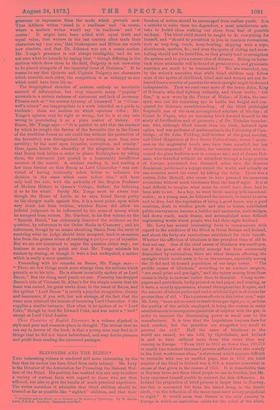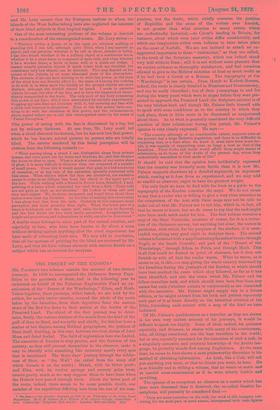BLINDNESS AND THE BLIND,
Tins interesting volume is rendered still more interesting by the fact that its author has been blind from early infancy. Mr. Levy is the Director of the Association for Promoting the General Wel- fare of the Blind. His position has enabled him not only to collect a variety of curious facts with regard to those who are thus afflicted, but also to give the results of much practical experience. The writer considers it advisable that blind children should be 'treated as far as possible like " sighted " children, and that their • Blindness and the Blind; or, a Treatise on the Science of Typhlology. By W. Hanka Levy, F.E.G.S. London: Chapman and HalL freedom of action should be encouraged from earliest youth. It is a mistake to make them too dependent, a most mischievous mis- take to forbid them walking out alone from fear of possible mishaps. The blind child should be taught to do everything for himself, and "should be permitted to join in common recreations, such as leap-frog, touch, hoop-bowling, skipping with a rope, shuttlecock, marbles, &c., and even the sports of sliding and snow- balling should not be forbidden, as they greatly tend to strengthen the system and to give a correct idea of distance. Riding on horse- back when attainable will be found of great service, and gymnastic exercises are much to be commended." We are reminded, too, by the writer's narrative that while blind children may follow most of the sports of childhood, blind men and women are not de- barred from a number of pursuits for which eyesight might be deemed indispensable. Thus we read once more of the brave John, King of Bohemia, who died fighting valiantly, and whose motto, "Ids dien," is now worn by the Prince of Wales ; of Ziska, the one- eyed, who lost his remaining eye in battle, but fought and con- quered for Bohemia notwithstanding ; of the blind philologist Scapinelli, one of the most accomplished scholars of his day ; of Count de Pagan, who on becoming blind devoted himself to the study of fortification and of geometry ; of Dr. Nicholas Saunder- son, who, although blind almost from his birth, lectured upon optics, and was professor of mathematics in the University of Cam- bridge ; of Sir John Fielding, half-brother of the great novelist, and Chief Magistrate of Bow Street Police-Court, whose " acute- ness on the magisterial bench may have been equalled, but has never been surpassed ;" of Huber, the eminent naturalist, who in- vented the glass beehives now in common use ; and of James Hol- man, who travelled without an attendant through a large portion of Europe, penetrated five thousand miles into the Russian dominions, performed a voyage round the world, and actually on one occasion saved the vessel by taking the helm. There was a certain John Metcalf, who seems to have pursued his numerous avocations without much hindrance from the loss of sight. It is at least difficult to imagine what more he could have done, had he been able to see. As a boy, he went birds'-nesting with his school- mates; as a young man, he followed the hounds, he learnt to swim and to dive, had the reputation of being a good boxer, was a good musician, dealt in woollen goods and also in horses, established public conveyances, became a builder and contractor, built bridges, laid down roads, made drains, and accomplished some difficult engineering works which people who had their sight declined.
Mr. Levy has several interesting facts to communicate with regard to the condition of the Blind in Great Britain and Ireland, and about the forty-six institutions established for their benefit. Whether the affliction of blindness is less prevalent than of old he does not say. One of the chief causes of blindness was small-pox, but if the power of this fearful scourge has been enormously diminished by vaccination, there are other diseases affecting the eyesight which would seem to be on the increase, especially among the ill-fed and ill-housed population of our large towns. "The prolific causes of blindness," according to an eminent surgeon, "are small print and gas-light," and the injury arising from these causes is likely to increase rather than to diminish. Cheap news- papers and periodicals, badly printed on bad paper, and bearing, as it were, a mouldy appearance, abound throughout the Empire, and the amount of labour performed under artificial light is of course far greater than of old. "The injurious effects in this latter case," says Mr. Levy, "seem not so much to result from gas-light per se, as from the quality of the article employed, it being the custom in many establishments to incorporate quantities of sulphur with the gas, in order to increase the illuminating power at small cost to the manufacturer. It is true that the Legislature imposes fines for such conduct, but the penalties are altogether too small to prevent the evil." Half the cases of blindness in the world are caused, we are told, by Ophthalmia, and Ireland is said to have suffered more from this cause than any country in Europe. "From 1849 to 1861 no fewer than 199,773 or nearly two hundred thousand persons suffered from this malady in the Irish workhouses alone," a statement which appears difficult to reconcile with one on another page, that in 1861 the total number of the blind in Ireland was 6,879, a number somewhat in excess of that given in the census of 1851. It is remarkable that in Norway there are three blind people to one in Sweden, but Mr. Levy expresses himself unable to account for this difference. In Iceland the proportion of blind persons is larger than in Norway, but this is accounted for from the island being in the Arctic circle, "as the reflection of the moon upon snow is very prejudicial to eight." It would seem that Greece is the only country in Europe in which no institution exists for the relief of the blind,
and Mr. Levy asserts that the European nations to whom the islands of the West Indies belong have also neglected the interests of their blind subjects in that tropical region.
One of the most interesting portions of the volume is devoted to a consideration of the unrecognised senses. Mr. Levy writes :—
"Whether within a house or in the open air, whether walking or standing still, I can tell, although quite blind, when I am opposite an object, and can perceive whether it be tall or short, slender or balky. I can also detect whether it be a solitary object or a continuous fence, whether it be a close fence or composed of open rails, and often whether it be a wooden fence, a brick or stone wall, or a quick-set hedge. I cannot usually perceive objects if much lower than my shoulder, but sometimes very low objects can be detected. This may depend on the nature of the objects, or on some abnormal state of the atmosphere. The currents of air can have nothing to do with this power, as the state of the wind does not directly affect it; the sense of hearing has nothing to do with it, as when snow lies thickly on the ground objects are more distinct, although the footfall cannot be heard. I seem to perceive objects through the skin of my face, and to have the impressions imme- diately transmitted to the brain. The only part of my body possessing this power is my face; this I have ascertained by suitable experiments. Stopping my ears does not interfere with it, but covering my face with a thick veil destroys it altogether. None of the five senses have any- thing to do with the existence of this power, and the circumstances above named induce me to call this unrecognised sense by the name of Facial Perception.'"
This power of seeing with the face is diminished by a fog, but not by ordinary darkness. At one time, Mr. Levy could tell when a cloud obscured the horizon, but he has now lost that power, which he has known several persons to possess who are totally blind. The service rendered by this facial perception will be obvious from the following remarks :—
"When passing along a street I can distinguish shops from private houses, and even point out the doors and windows, &a, and this whether the doors be shut or open. When a window consists of one entire sheet of glass, it is more difficult to discover than one composed of a number of small panes. From this it would appear that glass is a bad conductor of sensation, or at any rate of the sensation specially connected with this sense. When objects below the face ape perceived, the sensation seems to come in an oblique line from the object to the upper part of the face. While walking with a friend in Forest Lane, Stratford, I said, pointing to a fence which separated the road from a field, 'Those rails are not quite as high as my shoulder.' He looked at them and said they were higher. We, however, measured, and found them about three inches lower than my shoulder. At the time of making this observation I was about four feet from the rails. Certainly in this instance facial perception was more accurate than sight. When the lower part of a fence is brickwork, and the upper part rails, the fact can be detected, and the line where the two meet easily perceived. Irregularities in height and projections, and indentations in walls, can also be discovered."
A similar sense belongs to some part of the animal creation, and especially to bats, who have been known to fly about a room without striking against anything after the cruel experiment has been made of extracting their eyes. We may add in conclusion, that all the systems of printing for the blind are reviewed by Mr. Levy, and that his little volume abounds with curious details on a subject which has an interest for everyone.



































 Previous page
Previous page